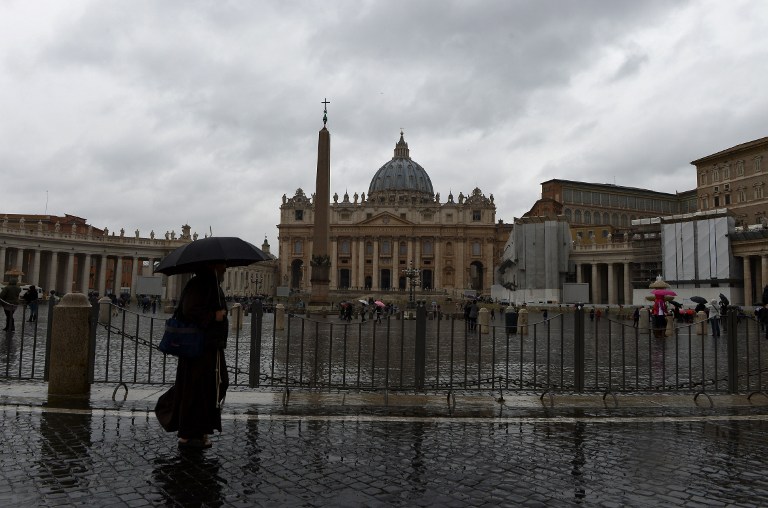SUMMARY
This is AI generated summarization, which may have errors. For context, always refer to the full article.

ROME, Italy – With no pope and no government, Rome residents could be forgiven for feeling a little apocalyptic after the first papal resignation in 700 years and an Italian election that could bring down the eurozone.
The Eternal City has seen the rise and fall of an empire, multiple barbarian invasions and a few bombardments in its nearly 3,000 years of history.
However unprecedented the current situation — at least in the city’s modern history — it is still better than being pillaged by barbarian hordes.
And some observers feel this limbo could herald some much-needed fresh air blowing through Rome’s musty palaces of power both Vatican and Italian — often consumed by intrigue and corruption.
“Today Rome is empty, waiting for someone to come and occupy its palaces,” said Ferruccio Sansa, a columnist for Italian daily Il Fatto Quotidiano.
“The places of power can also be the places where we outline a better future,” he said.
Whoever moves in “has to be conscious of the call of duty: inventing a new Renaissance,” he said.
Speaking of Renaissance, a new exhibition opened in Rome this week of works by Titian — a master who knew a thing or two about church and state.
Particularly striking are the portraits of Holy Roman Emperor Charles V at the height of his powers and Pope Paul III — a master schemer and Roman aristocrat who cemented his family’s power in a turbulent pontificate between 1534 and 1549.
The pope is depicted as a hunched old man in his papal vestments but with a bone-chilling stare.
Although mild by Renaissance standards, there is an air of intrigue in Rome these days too,despite an oath of secrecy on pain of excommunication sworn by cardinals not to reveal any details of their deliberations on election a new pope.
Multiple scenarios on how Italy’s political impasse could be resolved have also been flying around, as have rumors of deep divisions between cardinals over the government of the Church.
Ezio Mauro, editor of the Italian daily La Repubblica, said Italy like the Vatican also had a “Sede Vacante” (“Vacant See”) — the official description of the interim period between popes.
He has not been the only one to conflate the two situations on the two sides of the River Tiber.
“Italians have always confused the sacrality of God and that of Caesar,” Sansa said.
One victim was Ghanaian cardinal Peter Turkson — who was pranked with some official-looking fake election posters put up around central Rome by a group of Roman artists urging cardinals to vote for him.
Italy’s political system is stuck because the vote in last week’s elections basically split the spoils three ways between the centre-left, the centre-right and a new anti-establishment party, leaving no single political group in control of parliament.
The divided new parliament is expected to meet on March 15 after which formal negotiations on forming a new government, hosted by Italian President Giorgio Napolitano, will officially begin.
The situation is as confusing inside Italy as it is appears from the outside, and one suggestion being bandied around in recent days is that the 87-year-old Napolitano himself could form an emergency government to prepare for new elections.
The main novelty in the election was the huge vote given to comedian Beppe Grillo.
Many Italian media referred to a recent closed-door meeting by Grillo’s party as a conclave — although the live streaming on the Internet was quite different from the centuries-old papal election held in strictest secrecy.
No date has yet been set for the conclave to elect a new pope, but it could fall around the same date as when the Italian parliament is set to meet.
For the superstitious, that day is also the “Ides of March” — the same Roman feast day when Julius Caesar was assassinated in the name of democracy.
More superstitious still, some Italians are looking at a popular prophecy that the next pope will be the last before the end of the world.
According to the 12th century superstition, Benedict XVI will be the penultimate pope and the next one will be called “Peter the Roman”.
Il Fatto Quotidiano columnist Marco Travaglio was altogether less foreboding but said Benedict’s act of resignation had been revolutionary — more so than an Italian political system still stuck in its old school ways.
“While a pope stops being pope and goes down in history with a few simple gestures and phrases, opening the way for a renewal of the world’s most ancient institution, Italian politics and political journalism are lost in Byzantine practices and decrepit political formulas.” – Rappler.com
Add a comment
How does this make you feel?
There are no comments yet. Add your comment to start the conversation.